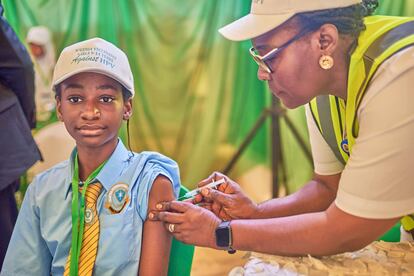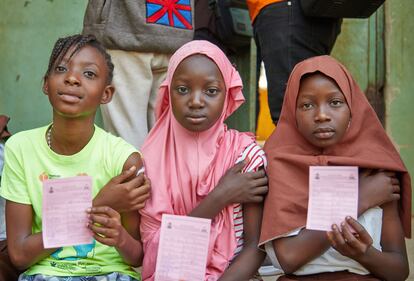Nigeria begins Africa’s largest human papillomavirus vaccination campaign
The country plans to immunize 7.7 million girls and adolescents against this pathogen, which causes the majority of cases of cervical cancer. About 8,000 Nigerians died from this cause in 2020, as cases are detected when they are advanced

When Ruth Ebi was diagnosed with cancer in Dec. 2022, she felt depressed. Before visiting a hospital in Lagos, southwest Nigeria, for a medical test, she had repeatedly experienced bleeding after sex. After sharing the test result with her husband, they both consulted a doctor at the Lagos State Governor Teaching Hospital the following day. “The doctor at the hospital said she was going to have surgery that may include removing most of the cervix or the womb,” remembers Emmanuel Ebi, her husband. “After such a procedure, she was expected to commence radiotherapy and chemotherapy.”
When they got home, Ruth cried profusely. They had no kids, and she blamed her husband for asking them to delay parenthood until they completed their plans to move overseas. Now that the treatment of her disease may require the removal of her womb, she thought her life had come to an end and became traumatized. “My wife was scared, so she objected to doing the surgery and having chemotherapy. We decided to opt for herbal treatment because it is cheaper and far more accessible. Months after she started using some herbal concoction, her situation worsened, leading to her death,” Emmanuel says.
Ruth is one of the 8,000 deaths from cervical cancer recorded every year in Nigeria. According to the country’s Minister of Health and Social Welfare, Muhammad Ali Pate, “the loss of about 8,000 Nigerian women yearly from a disease that is preventable is completely unacceptable.”
Cervical cancer is one of the most common cancers among Nigerian women. It is the fourth most common cancer among women globally. According to the World Health Organization (WHO), the disease caused at least 342,000 deaths globally in 2020. The majority of cervical cancer cases are due to the human papillomavirus (HPV), the most common viral infection of the reproductive tract. While it takes 15 to 20 years for cervical cancer to develop in women with normal immune systems, it can take only 5 to 10 years in women with weakened immune systems.
Measures to curb the disease
According to the WHO, HPV vaccines are safe and effective in preventing HPV infections. To prevent cervical cancer, the WHO recommends vaccinating girls aged 9 to 14 years, when most have not started sexual activity.
Nigeria is one of the countries that have started to vaccinate its citizens to prevent HPV-related cancers. On October 24, the government announced the inclusion of this immunization in its routine vaccination program, with the goal of reaching 7.7 million girls. If the goal is met, it would be the highest number achieved in a single round of HPV vaccination on the African continent as part of a campaign to immunize against the virus that causes nearly all cases of cervical cancer.

In the first phase, according to the Global Alliance for Vaccines (Gavi), 16 of the country’s 36 states will attempt to immunize just over 7.1 million girls in three months. “By January 2024, the phased campaign will sweep across the entire country,” Gavi said in a statement. “By the end of 2025, Nigeria aims to have vaccinated 16.6 million girls aged nine to 14 against the sexually transmitted virus, which is responsible for nearly all cases of cervical cancer,” the document adds.
The Federal Ministry of Health, with the support of Gavi, UNICEF and the WHO, among others, will provide free doses for HPV types 16 and 18. Until now, the vaccine was available through private clinics for around $65 a dose, about twice the national monthly minimum wage. “The onset of the vaccination campaign is an opportunity to safeguard our girls from the scourge of cervical cancers many years into the future,” the health minister said at the presentation of the initiative.
Eduardo Celades Blanco, head of health at UNICEF Nigeria, points out that this campaign is a historic event. “We (UNICEF) fully support this initiative and we have brought more than 6 million doses of the vaccines to different states to the country. We are targeting girls from 9 to 14 years old.” He added that UNICEF has also helped with logistical support for vaccination campaigns and also distributed cold chain equipment for vaccine preservation. In addition, the organization has trained more than 35,000 health workers and established vaccination points in the 4,163 districts in the 16 states where the first phase will be implemented.
Measures to combat disinformation
The emergence of vaccine misinformation and disinformation has cast a looming shadow over the success of immunization programs in Nigeria. There are false claims that the vaccine is unsafe, ineffective, and causes infertility. The false information has made some parents in rural communities withhold their children from being inoculated.
“There is a lot of misinformation in the public domain about the vaccine, but we have introduced this vaccine in more than 100 countries aside from Nigeria. So, we are working with community and religious leaders to enlighten people about the advantage of the vaccine. The government has also been vocal on the campaign,” explained Celades. The agency has produced radio and television informational materials in several local languages “to dispel misinformation and rumors.” In addition, it supported a group of researchers to conduct two rounds of preparedness assessments “to understand people’s feelings about the HPV virus and the vaccine,” it said in a statement.
Subomi Olatunji, a gynecologist at the Obafemi Awolowo University Teaching Hospital, explains that there is no link between the HPV vaccine and infertility in women, saying preventing the HPV infection is the best way to tackle cervical cancer because Nigeria has limited capacity to manage the disease. “What the government must do is to ensure that they carry out sensitization and awareness programs through community and religious leaders in rural communities on the importance of the vaccine,” she says.
“If not properly addressed, cervical cancer may lead to blockage of the fallopian tubes or cause ovarian cyst damage to the ovaries, hence the need why children should be vaccinated early before they become sexually active. The media must also play its role in ensuring that health reports are properly fact-checked to guide public perception in the right direction,” she adds.
Sign up for our weekly newsletter to get more English-language news coverage from EL PAÍS USA Edition
Tu suscripción se está usando en otro dispositivo
¿Quieres añadir otro usuario a tu suscripción?
Si continúas leyendo en este dispositivo, no se podrá leer en el otro.
FlechaTu suscripción se está usando en otro dispositivo y solo puedes acceder a EL PAÍS desde un dispositivo a la vez.
Si quieres compartir tu cuenta, cambia tu suscripción a la modalidad Premium, así podrás añadir otro usuario. Cada uno accederá con su propia cuenta de email, lo que os permitirá personalizar vuestra experiencia en EL PAÍS.
¿Tienes una suscripción de empresa? Accede aquí para contratar más cuentas.
En el caso de no saber quién está usando tu cuenta, te recomendamos cambiar tu contraseña aquí.
Si decides continuar compartiendo tu cuenta, este mensaje se mostrará en tu dispositivo y en el de la otra persona que está usando tu cuenta de forma indefinida, afectando a tu experiencia de lectura. Puedes consultar aquí los términos y condiciones de la suscripción digital.








































